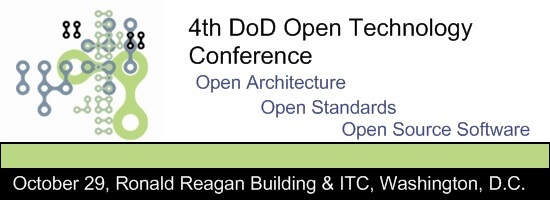Note: This post was delayed a couple weeks.
Today Scott Stults and myself traveled up to DC to exhibit and attend the DoD Open Technologies Conference. We attended last year where Matt Jenks and myself spoke on Agile techniques for Green Field/Brown Field Enviroments. The conference has moved to the Ronald Reagan International Trade Center in downtown DC, and as a venue is a much nicer, much brighter space.

The initial keynote was by Bill Vass, President and COO, Sun Microsystems Federal, and I expected something similar to Scott McNeelys keynote at FOSE. His presentation touched on the same topics of why Sun has open sourced its IP, but focused a bit more on the US Governments involvement. One of the key strengths that Bill talked about was the ability for the Government to influence open source projects, and he gave a couple examples. One of the ones that he gave was that the NSA wanted to add “TE”, Type Enforcement, to Solaris. They asked Sun to do it, and Sun wasnt interested because Suns own internal security engineers didnt feel that TE was part of the vision for security. So what did the NSA do? They funded an open source project that extended Solaris to support TE, possible only because of Solaris being open source! And lo and behold, time passed and Sun ended up taking that enhancement and rolling it into their supported version of Solaris. There were a number of other examples ranging from changes to Solaris to changes to ODF made by various government agencies possible only because of open source. Without the source being open, even if the Government issued an RFP to a commercial vender to make these changes, without access to the source it wouldnt be possible.
Bill also put out some statistics on Sun as the #1 contributor to open source, which, while true, is mostly because of them taking so much proprietary code and open sourcing it, versus starting projects from open source. Suns revenue from licenses has gone up drastically since open sourcing their stack, but I feel that is because people were not willing to pay, post the dot com era, for Solaris when Linux was available. But with Solaris being on the same pricing structure as Linux, then it is more compelling!
He also made the same plug that Scott did that Java is on 6 billion devices. I hate that statistic, because when someone hears that, they mentally think of a rich environment where devlopers can write an app and have it run everywhere! But what that really means is that 5.5 billion of those devices are cheap cell phones running various versions of J2ME. Ive done some hacking with J2ME, and no two phones support it the same way, and there are too many levels of J2ME compliance. J2ME really is “Write Once, Test Everywhere!”
He pointed out that open source has many very compelling solutions in the IT plumbing realm of storage, server virtualization, os, database. However, I think open source still has a way to go up the food chain from making a big data center more efficient. He acknowledged that issue, talking about how moving to open source solutions for J2EE and database SQL centric apps is much easier then more traditional, older style apps like an ERP. J2EE, for all the shortcomings of JSP, EJB, etc, does make it easier to move from a commercial app server to something like JBoss or Glassfish by providing very open standards.
He also talked a bit about moving back office functions like calendering and email off of Exchange. “Its hidden from the user, they still use Outlook”. While I like the message, I dont see it yet. Exchange and Outlook work very closely together, and peoples email and calendering are very hot button issues.
Lastly he summed up Suns Lessons Learned after moving to open source in such a big way:
- More Secure
- Cost less, but not free
- Watch out for putting up your own dev shop, leave customizations to vendors
- Indemnity provides the same protection as a license. This sounded like another plug for Suns version of the projects!!!
- Stay with open standards, they make open source work. TCP/IP is critical to use open source networking tools for example. Standardizing on AppleTalk precludes the option of open source solutions!
It was a good presentation, I liked the focus on government helped the message resonate with the audience. However I felt like the focus on desktops moving to open source was a bit of a reach. There is so many places on the server, network end of things that open source can help, that changing the desktop is still a long way away. Unless you are building out a pure kiosk type solution, then the advantages that Microsoft enjoys on the desktop are still too strong. However, moving more to the web will reduce that advantage over time!
